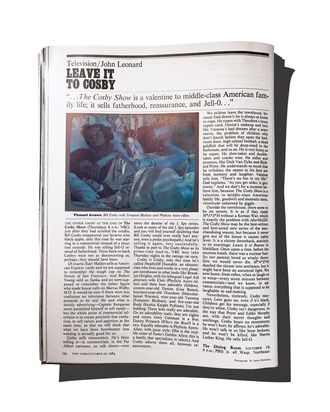
Looking back at what our contributors thought about season one, episode one of Saturday Night Live, Cheers, 30 Rock, and more.
All in the Family
“All in the Family does not have the explicitness of satire. Instead, it attempts to take a complete orthodox television idea — the family group — and implant its message in verbal slapstick. This relies, wishfully, on a belief that the grotesque parody of embedded bigotry will strike chords of self-recognition in the audience … But the trouble is that the virus being dealt with is more resilient than that, and it really is an insult to the gravity of the disease to hope that it might so easily be countered … I do not question CBS’s motives, only their judgment. After years of flak from paranoid politicians about the liberal conspiracy, they’ve blown another cause by using the wrong ammunition.” —Clive Irving, February 15, 1971
Saturday Night Live
“At 11:30 on Saturday night, NBC is presenting … the first attempt to program for, and with, the generation that grew up with television. Based on a first look, it is an uneven show, with all of the pitfalls and possibilities of something never tried before. But in intention, outlook, and personnel, NBC’s Saturday Night is surely the sharpest departure from the TV-comedy norm since the debut of Laugh-In … The promise of Saturday Night is enormous.” —Jeff Greenfield, October 27, 1975
Cheers
“Based only on a few episodes, Cheers has already been saluted as an Athenian classic, and many viewers have been primed to expect a cascade of laughter. Cheers is smartly written and even more smartly cast … But it’s also a very mild, unassuming and sugar-sprinkled comedy, one that makes you smile fondly rather than laugh.” —James Wolcott, October 25, 1982
The Cosby Show
“The Cosby Show is a valentine to middle-class American family life, goodwill and domestic mess, vicissitude suborned by giggle. Outside the townhouse, there seem to be no streets. It is as if they made M*A*S*H without a Korean War … The Cosby Show may be the best-written and best-acted new series of the merchandising season, but because it never gets out of the house it causes cabin fever … Tirelessly, Cosby reassures. Love goes on, even if it’s black. Children get his message, especially if they’re white. Cosby isn’t dangerous, in the way that Pryor and Eddie Murphy are, with their secret thoughts and seethings. Cosby bears no resentment; he won’t hurt; he affirms; he’s adorable. He won’t talk to us like Jesse Jackson, and he won’t be killed, like Martin Luther King. He sells Jell-O.” —John Leonard, October 22, 1984
The Golden Girls
“There are real people on The Golden Girls. They aren’t teenyboppers, nor do they surf or snort. … [The] jokes are as obvious as the weather or a broken arm. But between the jokes … there is respect and affection and worry. We are talking about friends, with calluses on their experience to improve their grip.” —John Leonard, October 14, 1985
“Golden Girls has settled for senior-citizen sex jokes, and needs a brain transplant.” —John Leonard, December 2, 1985
Roseanne
“Tired as I am of beautiful people who are sad inside their money, I’m equally suspicious of blue-collar cute. But Barr, a talk-show and HBO regular, is a mistress of the drop-dead one-liner. She gets off more of them per sitcom than anybody since Jack Benny, which is going to be exhausting for the writers.” —John Leonard, November 7, 1988
Will & Grace
“In what has to be a first, it actually got queerer as it got closer to airing: Originally, Will seemed straight, but now he’s out — as is his super-queeny pal, with whom he even discusses cruising on the Internet. That’d be astonishing enough, but the show, about Will and his best (female) friend, Grace, is quite funny to boot.” —Ariel Kaminer, September 14, 1998
30 Rock
“The surprise to me is how overcooked and puerile 30 Rock seems, a deep-down conventional sitcom trying too hard to be hip, as if to find its inner Larry Sanders. Alec Baldwin is a hefty bag of tricks as network vice-president of East Coast programming and microwave ovens, but otherwise there was only one good joke in the pilot (about Urkel and black nerdiness).” —John Leonard, September 25, 2006
Girls
“From the moment I saw the pilot of Girls, I was a goner, a convert. In an office at HBO, my heart sped up. I laughed out loud; I ‘got’ the characters — four friends, adrift in a modern New York of unpaid internships and bad sex on dirty sofas. But … as a person who has followed, for more than twenty years, recurrent, maddening debates about the lives of young women, the series felt to me like a gift.” —Emily Nussbaum, March 25, 2012
*This article appears in the June 13, 2016 issue of New York Magazine.


